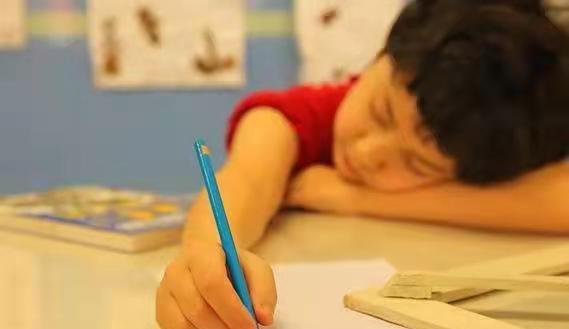After my ten-year-old nephew got out of school, I asked him, "Do you have any homework?" The child asked me, "What if there is?" ”
I said, "If you have it, go upstairs and write your homework." ”
"So what if not?" The nephew continued to ask.
I said, "If you don't have it, play!" ”
The nephew said dismissively, "Then I'll say no!" If I can play like this, why don't I? I'm not a fool! ”
I was speechless...

Later, after slowly communicating, I discovered my nephew's concerns. I came with my son, and he wanted to play with his cousin for a while, and if he wrote his homework first, he would write until seven or eight o'clock, afraid that I would not be able to play when I left.
At the end of the day, there is not enough time, and the child does not want to write homework, but does not want to miss the time with his cousin.
Children want to do more things, but less free time at their disposal. Looking back, it seems that most of the time after school is writing homework, which is a common problem for many children.
As parents, we want to care about our children's learning, not just by asking, but by solving problems from the root causes, helping children to arrange to-do items reasonably, and fully improving learning efficiency.
In the chapter "How to Manage Time to Improve Efficiency" in "How to Learn Not to Move", children "want to make more time", 1016 Jun said: Although there are many things to do, in fact, the importance and urgency of each thing are different, you can classify them. Record the time it takes to do some fixed things and compare them, and consciously improve speed and efficiency.
Such easy-to-understand language, at-a-glance charts and vivid and interesting cartoons have a strong sense of substitution, and children are willing to read and understand.
"What to do if you can't learn" is one of the "1016 growth mailboxes", this set of five books, the other four are "It's good to have friends", "What do parents really think", "The body can be more comfortable" and "The psychological world is so magical".
"1016 Growth Mailbox", as the name suggests, "Letters for children aged 10-16", combined with psychological knowledge, popularized science in the form of cartoons, and helped them understand more about what their psychological world is experiencing in a way that they find interesting.
I told my nephew about the book and suggested that he write down the things he was going to do today, and then quantify these things according to the two dimensions of "important" and "urgent". In this way, the child's heart is not so big ideological baggage.
Many times, children are frightened by the mountains of to-dos in front of them, and if they really comb through them carefully, the burden will not be heavy.
There was an eight- or nine-year-old boy next to him, who had been in a painting and calligraphy class for several years, and his writing was still crooked. The child's mother said: "It is beautiful to write in the painting and calligraphy class, but once I write my homework, I can't read it!" ”
The boy said, "If I write my homework according to the requirements of the teacher of the calligraphy and painting class, then I will write about the Year of the Monkey and the Moon of The Horse, and I will not have to sleep at night!" "Spending money doesn't have an effect, which is ironic.
Let's look first at the two difficulties explained in the picture: the difficulty of reality and the difficulty of feeling. Isn't the difficulty encountered by the boy in the case the difficulty of reality breeding the difficulty of feeling?
Why? At the age of eight or nine, he went to several years of calligraphy and painting classes, but before the child was five years old, the muscle development of the hand was not mature, and the small hand had no strength, which was a real difficulty for the child.
Because of objective reasons, children are unable to meet the hopes of parents, and they also bring frustration to themselves, which becomes a difficulty in feeling.
Therefore, parents should not promote seedlings, nor should they "develop" their children's potential too early, so that their natural growth is not necessarily bad, what do you think?
Procrastinating, earning money, learning not moving, online lessons, strange costumes, learning to wander, chasing stars... Children aged 10-16 who encounter these common diseases in the process of growing up can get empathy and guidance in this set of books.
The 5 books in the fascicle, each corresponding to a theme, covers topics that are deeply confusing and difficult to discuss for children, and can solve a series of problems that make adults helpless!